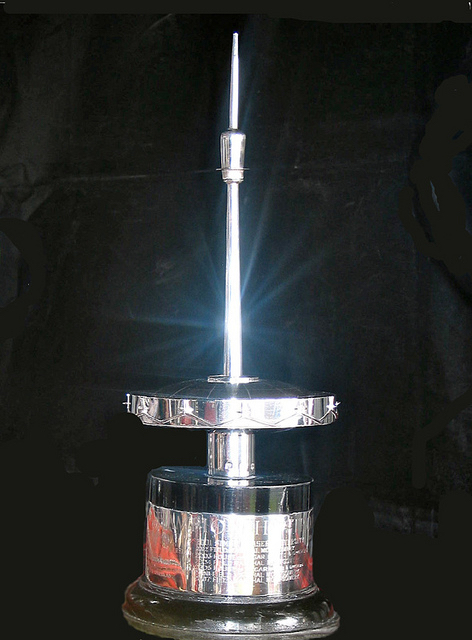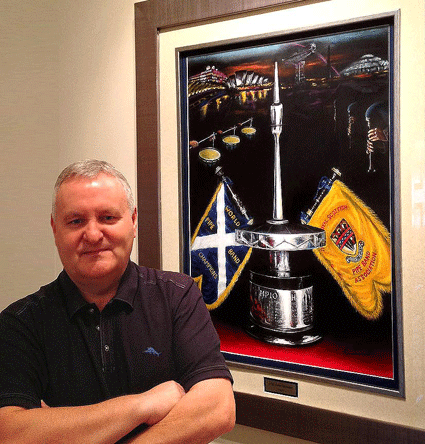In this concluding part of the interview given after his band, Shotts & Dykehead Caledonia, had triumphed in the 2000 World Pipe Band Championships, the popular pipe major talks us through the actual day of victory.

‘I think this year our MSR was better than when we won in 1997, and though people might think our medley is always stronger, I’ve actually won more championships playing MSR than I have medley.
On the Friday before the Worlds we will meet at the band hall at about 7.30pm. We all start playing pipes at the same time for ten minutes. Then we strike up as a band, set the chanters, try each set once through and go home.
At that point, I start to think about how I’m going to cope with the next day. I would be very nervous if I win it on the Friday night. I like a wee bit to do on the Friday, perhaps one or two reeds to sort. I try to identify the reeds that may give me a little bit of trouble on the Saturday.
I don’t earmark anyone that I might have to cut on the day. I would do that on the Friday, but it is highly unlikely that that would happen. It comes down to preparation. All the pipers and the drummers know that if they are not attending practices they can’t go on the park. We have guys who come from Aberdeen, Peebles, the Borders. Gourock, Stirling every night, or they take a week’s holiday and stay with someone who lives locally. That’s why we only do the five cham· pionships. The pipers and drummers can tell their wives that they are gaining on the Saturdays of the smaller contests – but that the week before the Worlds is mine. August was a very tough month with three championships and the concert.
My parting words on the Friday are to the effect that everyone must take their pipes into the house and not leave them in the car, and not to touch them until the following day. On the Saturday we meet at the band bus at Glasgow Green at midday. Things were a bit different this year because the pre-qualifiers didn’t know what time they were going to be playing.
There was a scene outside the draw whereby mobile phones were being held up to catch the announcement and relay it back to the various band buses. I didn’t like that aspect this year. I felt it penalised pre-qualifiers. If you were a qualifier from the morning you knew the tone you were carrying and you knew how long it would take you to get the pitch up in the conditions. I appreciate, of course that having to play three times is a burden in itself.

We were third on and Simon Fraser were first on. I was pleased about this because you always want to play close to your main competitors. That way the judges can make a clearer comparative judgement. Whilst on the point of draws, I have to say that I don’t agree with them. I think it is a crazy way to operate. Our other main competitors on the day I knew would be the Field Marshal and I’m always impressed with the 78th Frasers. They have a musical panache which never seems to die.
Back at the bus everyone was waiting for me to say ‘right, let’s go’. I played my pipes for a couple of minutes to check the reading to see how much lower they were from the practice hall. We start to warm up around 15 minutes before we compete, but if the pitch has dropped dramatically we will start a bit earlier. We will start by individually blowing our pipes, and then the pipers come to me one at a time to check the chanters.
On the day there was a bit of humidity around and I wanted to make sure we didn’t lose our top hand sound. We spent a lot of time on that. We play the set or selection in part and then bring the drummers in to try the breaks. All this time we are making our way over towards the arena.
I have, of course, planned the route we will take beforehand, and I have someone who keeps me posted when the band before us is on. Up to the line, it was very noisy and I couldn’t hear the pipes. I was apprehensive because I wanted the pipes to be good. I knew we were going to be judged against the sound we had at the concert.
If you are a band that is winning prizes, very often you are not judged against the other bands – you are judged against yourself. Another thing I was apprehensive about was that consultative judging is no longer being used. The results in contests leading up to the Worlds showed great differentials one judge to another. Some were putting a band first and another placing the same band fifth. I am sure the consultative process would have remedied some of that, albeit that it is treating the symptoms rather than the root cause.
The Worlds final, and especially the medley competition, have now reached a level of musically which I think is beyond anything heard even a few years ago. When I read some judge’s sheets and hear some of them on the radio it is obvious they have been brought up in a very narrow musical spectrum. This is not a criticism of the judges, it is just that the music has moved ahead. Bands are being allowed to go off in whatever musical direction they see fit but there is no guidance from the association or the judges themselves. That is a worry.
We played the MSR and I thought it was as good as any we had ever played. When we came off I spoke to the band and told them we could win it as long as we didn’t leave any doors open in the medley. The drummers were as happy as I was. They’ve been happy all year right enough, although they have received some of their poorest results. I think some of their most musical performances have been this year.
We went back to the bus and dried out the pipes. I try to keep the rest of the players away from the other bands. I don’t want them getting too caught up in the contest. It can be very off-putting if you hear a good performance.
Before the medley, we again start 45 minutes before but with less playing in the lead up to the performance. We just keep checking the pipes and the drones. I was determined this year that we had a good drone sound and this year we have radically altered that.
On the way up to the medley I asked the band to imagine they were playing the concert again and to give me the same performance. At the Worlds the crowd round us can be ten deep and it is easy for the younger players to be intimidated or overawed, so I am continually giving them things to focus on, things to keep their attention. I do my fair share of shouting and bawling. I am aware that the pipers are watching me and I have got to show them some sort of satisfaction about how things have gone so far to keep the confidence up. After making our way to the line we launched into the selection.

Once we had a good start with a clean E we got into the circle and I started to enjoy the performance. We were comfortable. The band was ready for it. After we came off, I knew we’d be in the shake up at the end. I didn’t know we had won it, but I knew we’d be there or thereabouts. I got a lot of positive feedback from people who’d heard us, but you can’t always go by that. I knew we had won championships with lesser performances and that gave me confidence.
At the march past, the usual rumours were flying around but you don’t know you’ve won until your name is called. Then we heard the RUC had won the drumming and the Field Marshal were second that raised the tension, but when our name was called in first place it was a fantastic feeling. It was probably our most satisfying win because of the way we played.
Next year? We need to come out with a new medley and do the same again. We already have some of the tunes sorted out for that. I am not going to sit back and wait to see where the challenge comes from.’
• Do you have a day at the Worlds you’d like to share with the rest of the pipe band community worldwide? Send your story to pipingpress@gmail.com.




















Recent Comments